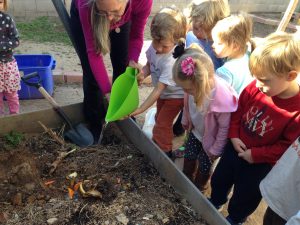 It’s never too early to learn about compost. We have endless opportunities every day at the Seed. Snack scraps, lunch leftovers, stems and leaves from harvested produce. Even the toddlers and preschoolers are learning about this process. Earlier in the week I visited with the Preschool 2.5/3s to kick-start their composting project. With a load of compost on loan from the K-1 class and an additional collection left from snack, we sat in a circle outside and went through the containers, one food item at a time. First we looked at a grapefruit peel and talked about how if you put it in the soil it will make other soil that will help the garden grow better. Each time a new food scrap was retrieved from the container we reviewed the concept with questions and explanations. Together we learned that anything from a whole food can turn to compost. This includes banana peels, apples, grapes, tomatoes, carrots, cucumbers, and even egg shells as good items for composting.
It’s never too early to learn about compost. We have endless opportunities every day at the Seed. Snack scraps, lunch leftovers, stems and leaves from harvested produce. Even the toddlers and preschoolers are learning about this process. Earlier in the week I visited with the Preschool 2.5/3s to kick-start their composting project. With a load of compost on loan from the K-1 class and an additional collection left from snack, we sat in a circle outside and went through the containers, one food item at a time. First we looked at a grapefruit peel and talked about how if you put it in the soil it will make other soil that will help the garden grow better. Each time a new food scrap was retrieved from the container we reviewed the concept with questions and explanations. Together we learned that anything from a whole food can turn to compost. This includes banana peels, apples, grapes, tomatoes, carrots, cucumbers, and even egg shells as good items for composting.
Spontaneously one of the young preschoolers asked, “What about pizza?” Another chimed in with “What about pepperoni?” That was a perfect lead-in to foods that DON’T work for compost, foods with fats or meat. I could tell this was going to be an ongoing discussion of sorting and categorizing compostable vs. non-compostable foods. After most of the questions seemed answered and the general concept was in place, we migrated over the their already-established compost area to learn about the next phase of the process. We dug a hole and carefully dumped the food scraps in the hole. Then we carefully sprinkled some dirt over the scraps to help them decompose faster, and added a small amount of water to enhance the process. Everyone seemed to feel proud of learning about and taking care of this important task.
In the coming days, this class and others at the Seed will expand their composting practices. Undoubtedly, the daily curriculum will include sorting and making graphs of food pictures and other items that will fall into one category or the other. The job of composter will be added to the list of daily tasks and new compost areas will spring up in outdoor classroom areas. The soil around the Seed will be enhanced as food scraps miraculously turn into nutrients for future gardens. Even more important, a whole crop of Seeds will be trained to help the planet in yet another way. It may seem like a small gesture, composting an apple core or a half-eaten cucumber, but at the end of the day, every time we reduce the waste in landfills and offer it instead as a gift to the earth, we brighten our children’s future in ways we may not yet fully comprehend.
